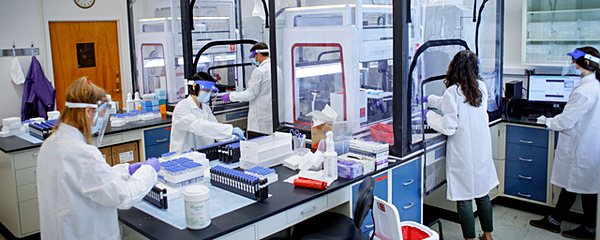- By Abigail Butler
- Around Town
 Print
Print 
Once they're logged in at the Cornell COVID-19 Testing Laboratory (CCTL), based in the College of Veterinary Medicine, a robot will pipette the liquid samples into pools of five. The pools will then be processed in batches of 93 at a time – ultimately yielding test results within 24 hours for 5,000 to 7,000 Cornell students, staff and faculty per day.
It's a massive undertaking in a state-of-the-art lab built from scratch in less than two months, based on data-driven models, research and interdisciplinary expertise across Cornell's campuses; and with support and guidance from Cayuga Health System's medical and laboratory leadership.
The CCTL's surveillance efforts began Aug. 17 and will gear up Sept. 2 for twice weekly testing for undergraduates and weekly tests for graduate students, faculty and staff. The rapid turnaround of test results is a cornerstone of the university's plan to reactivate campus as safely and scientifically as possible.
"This has been an amazing effort by a lot of people to bring it to fruition in such a short amount of time," said Dr. Lorin Warnick, Ph.D. '94, the Austin O. Hooey Dean of Veterinary Medicine. "Faculty and staff here in Ithaca and colleagues from Weill Cornell Medicine, working with Cayuga Health System, have all come together to develop the techniques, validate the testing and build the capacity to offer surveillance testing, further enhancing what's needed in the community at large."
The lab is brand new, but it builds on a foundation of existing skills. CCTL's director, Dr. Diego Diel, associate professor in the Department of Population Medicine and Diagnostic Sciences, directs the virology lab in CVM's Animal Health Diagnostic Center (AHDC). CCTL has eight full-time staff members – all are part of the diagnostic center – and is recruiting additional staff so it can increase capacity.
Beginning Sept. 2, students, faculty and on-campus staff will be required to undergo regular surveillance testing, with seven sites on the Ithaca campus where people can self-collect nasal swab samples, under supervision. These samples will then be transported to CCTL, where the testing process takes place.
Once the pooled samples are placed on 96-well plates – three of the wells are used for controls, and 93 are active pools – they're subjected to a nucleic acid extraction, to purify viral RNA from the samples. The viral RNA is then tested using PCR to detect SARS-CoV-2.
Pools with positive cases emit a fluorescent glow; individual samples making up positive pools undergo retesting to identify the infected individuals. The Tompkins County Health Department will handle case management and contact tracing for confirmed cases.
The biweekly and weekly testing regimen is based in part on models developed by Peter Frazier, associate professor of operations research and information engineering, which showed how aggressive testing can mitigate the spread of the virus, particularly among undergraduates living in close quarters. The surveillance testing is expected to identify additional positive cases, but discovering and isolating asymptomatic infected people will slow the virus's spread.
"We've done our absolute best to develop a reliable test to use in a comprehensive surveillance program, and we've done that in partnership with members of the community," Warnick said. "All of us involved with this are part of the local community. And, of course, our motivation is as strong as anyone's to do all we can to help control COVID-19 in our local area."
The federal government's Clinical Laboratory Improvement Amendments (CLIA) regulate laboratory testing and require clinical laboratories to be certified by the Center for Medicare and Medicaid Services. Cayuga Health will continue to provide oversight to the CCTL as part of their certification as a CLIA laboratory for the region.
"Cornell is enormously grateful to Cayuga Health for their partnership in this endeavor which will enable Cornell to conduct the comprehensive testing needed for the university's COVID-19 public health program," Warnick said.
v16i35



